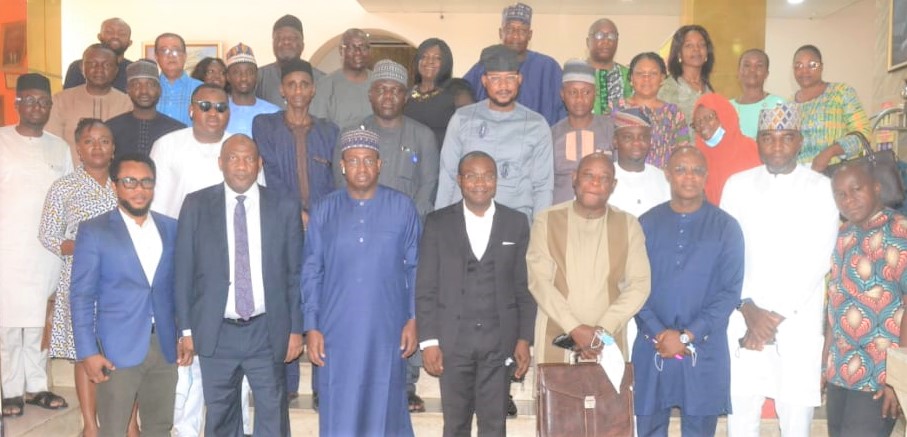Caption: From left, Justice Nnamdi Dimgba of the Federal High Court Awka Division; Aminu Ismail, Executive Director Operations, Asset Management Corporation of Nigeria (AMCON), and Joshua Ikioda, Group Head Enforcements, AMCON at the interactive session between AMCON and other government agencies and stakeholders in Abuja at the weekend.
Justice Nnamdi Dimgba of the Federal High Court Awka Division at the weekend applauded the Federal Government, National Assembly and Central Bank of Nigeria (CBN), for creating and granting the Asset Management Corporation of Nigeria (AMCON) some special powers to enhance the recovery of troublesome bad loans amounting to over N4.4tr from a few recalcitrant debtors.
Addressing participants at an interactive organized by the Legal Academy for Land Registry Officials, Corporate Affairs Commission personnel, AMCON, and other stakeholders of the Federal Government, on Saturday in Abuja, Justice Dimgba argued that said there is a need to do whatever it takes within the ambit of the law to ensure that such debtors holding the collective commonwealth of Nigeria are made to return them to the government through AMCON.
The judge, who was reacting to the enormous powers granted to AMCON, said the latest amendment of its enabling Act is the only way to compel repayment, given its role as a ‘Special Animal’ created in 2010 to deal with a special problem in the country, which started with the global financial meltdown that affected many economies across the globe, including Nigeria.
Speaking earlier at the event, Aminu Ismail, Executive Director, Operations of AMCON, who represented Ahmed Kuru, the Managing Director/Chief Executive at the interactive session, reminded participants that the corporation’s mandate remains a national assignment, which requires the collaboration of all agencies of government.
Such high-level collaboration, he continued, is needed because of AMCON’s total current exposure on all Eligible Bank Assets (EBAs), only 350 outstanding obligors account for 83% of the total EBA balance, just as 244 of the top 350 obligors are in various courts. However, the collateral coverage is only 16% of the total current exposure.

A statement by AMCON recalled that upon taking over the loans in 2010, the corporation recapitalised a number of the affected financial institutions, in a bid to stabilize the financial sector, following which it has the mandate to recover the debt.
Aside from the banks that were destroyed by these obligors, other sectors of the Nigerian economy such as the oil and gas establishments, manufacturing firms, airlines, real estate and construction companies, maritime firms and power generating organisations, and insurance companies, among others, were affected.
But as AMCON intensifies efforts to recover the huge outstanding debts, these obligors, it regretted, “have perfected the act of hiding under all sorts of technical lacunas in the AMCON Act to frustrate recovery.
On the other hand, the Federal Government through the National Assembly is also thinking ahead, hence some amendments in the Act establishing AMCON, which gives AMCON some additional powers that would hasten their recovery mandate.
Only recently, President Buhari again signed into law the Asset Management Corporation of Nigeria (Amendment) Act, amending the AMCON Act No.4, 2010. The AMCON Act among other adjustments provides for the extension of the tenor of the Resolution Cost Fund (RCF) and grants access to the Special Tribunal established by the Banks and other Financial Institutions Act 2020, which confers on AMCON the power to among others, “to take possession, manage, foreclose or sell, transfer, assign or otherwise deal with the asset or property used as security for Eligible Bank Assets (EBAs), and related matters.’’
This latest development has also attracted criticism especially from the quarters of the obligors and those sympathetic to the obligors.








